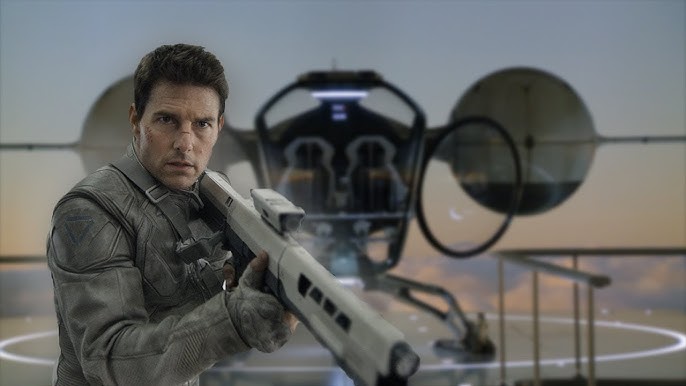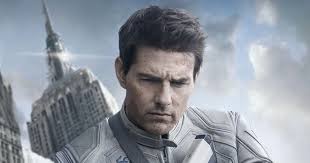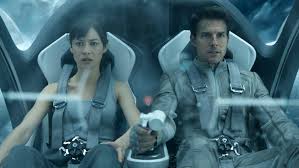🎬 Oblivion (2013)

“Oblivion” (2013): A Visually Stunning Sci-Fi Meditation on Memory and Identity
Directed by Joseph Kosinski, Oblivion (2013) is a visually breathtaking science fiction epic that explores themes of identity, memory, and the nature of humanity. Starring Tom Cruise in one of his most introspective roles, the film combines high-concept storytelling with a haunting, post-apocalyptic aesthetic. While Oblivion delivers a captivating sensory experience, its narrative doesn’t always match the depth of its ambition, leaving some viewers intrigued but unsatisfied.
Plot Summary
Set in 2077, Oblivion unfolds on a ravaged Earth, decades after an alien invasion left the planet uninhabitable. The surviving human population has relocated to Titan, Saturn’s moon, leaving a few operatives to oversee the extraction of Earth’s remaining resources. Jack Harper (Tom Cruise) is one such operative, tasked with maintaining the drones that protect massive hydro rigs harvesting Earth’s oceans.
Jack works alongside Victoria “Vika” Olsen (Andrea Riseborough), his mission controller and partner, with both under the supervision of Sally (Melissa Leo), a commanding figure who communicates from a space station orbiting Earth. Jack is haunted by fragmented memories of a life he doesn’t recognize—images of a woman (Olga Kurylenko) and a time before the war.
When a spacecraft crashes, Jack rescues the sole survivor, Julia (Olga Kurylenko), whose presence unravels everything he knows about his mission, his memories, and his identity. As he uncovers shocking truths about Earth, humanity, and himself, Jack is forced to confront a moral dilemma that will define the future of the planet.
Themes: Memory, Identity, and Humanity
At its core, Oblivion is a meditation on identity and memory. Jack Harper’s journey is one of self-discovery, as he pieces together a life that has been erased or manipulated. The film raises poignant questions about what defines us as individuals: Is it our memories, our actions, or our innate humanity?
The concept of duality is central to the narrative. Jack is both a product of advanced technology and a remnant of a lost humanity, embodying the tension between artificial constructs and genuine emotion. This struggle mirrors broader questions about the role of technology in shaping human identity.
The film also examines the cost of survival. The alien invaders, referred to as the Tet, exploit humanity’s desperation to preserve itself, manipulating Jack and Vika as pawns in a larger scheme. This highlights the dangers of sacrificing autonomy and morality for survival.
Visual and Cinematic Excellence
One of Oblivion’s greatest strengths lies in its stunning visual design. Director Joseph Kosinski, known for his work on Tron: Legacy, creates a hauntingly beautiful vision of Earth’s post-apocalyptic future. The film’s aesthetic blends stark minimalism with sweeping grandeur, juxtaposing desolate landscapes with sleek, futuristic technology.
Claudio Miranda’s cinematography captures the desolation and eerie beauty of the ruined Earth. Iconic locations like New York City are reduced to unrecognizable wastelands, with the remnants of landmarks like the Empire State Building serving as haunting reminders of what was lost.
The design of the Sky Tower, Jack and Vika’s home base, is a triumph of minimalist futurism. The contrast between its sterile, pristine interiors and the rugged, decayed world below reflects the film’s exploration of duality. The drones, with their sleek, menacing design, add an element of tension to every scene in which they appear.
Tom Cruise’s Performance as Jack Harper
Tom Cruise delivers a nuanced performance as Jack Harper, balancing the character’s existential confusion with his innate heroism. Cruise’s ability to convey vulnerability and determination makes Jack a relatable protagonist, even as the film’s twists challenge the audience’s understanding of his true nature.
Jack’s internal conflict is the emotional core of the film. His longing for a past he doesn’t fully understand, coupled with his growing awareness of the truth, creates a compelling character arc. Cruise’s physicality, particularly in action sequences, adds energy to the film, while his quieter moments bring depth to Jack’s emotional journey.
Supporting Cast
Andrea Riseborough as Victoria “Vika” Olsen
Andrea Riseborough delivers a standout performance as Vika, Jack’s mission partner and romantic companion. Vika’s unwavering loyalty to their mission contrasts with Jack’s growing doubts, creating a tense dynamic that underscores the film’s themes of trust and control. Riseborough imbues Vika with a subtle vulnerability that makes her more than a simple antagonist.
Olga Kurylenko as Julia Rusakova
Olga Kurylenko’s Julia serves as a key to Jack’s past and a catalyst for his transformation. While her character is central to the plot, Julia’s development feels underwhelming compared to the depth of Jack and Vika. Kurylenko’s performance is heartfelt, but the script doesn’t fully explore her perspective or emotional struggles.
Morgan Freeman as Malcolm Beech
Morgan Freeman brings gravitas to Malcolm Beech, the leader of the human resistance. Beech serves as a mentor figure for Jack, offering guidance and revealing the truth about the Tet’s manipulation. Freeman’s commanding presence elevates the role, though his character’s limited screen time leaves him feeling more like a narrative device than a fully realized individual.
Melissa Leo as Sally
Melissa Leo’s portrayal of Sally, the artificial overseer of Jack and Vika’s mission, is chillingly effective. Her calm, maternal demeanor masks the Tet’s cold and calculating control, making her an unsettling antagonist.
Action and Pacing
The action sequences in Oblivion are meticulously crafted, combining high-energy combat with stunning visuals. Highlights include a tense battle between Jack and a rogue drone, as well as a climactic assault on the Tet. These scenes showcase Kosinski’s flair for visual spectacle while maintaining the film’s introspective tone.
However, the film’s pacing is uneven. The first act builds intrigue with its mysterious setup and world-building, but the second act slows down as it delves into exposition-heavy revelations. The final act picks up the pace, delivering an emotionally charged conclusion, but some viewers may find the transition jarring.
Sound Design and Musical Score
The sound design in Oblivion is immersive, with every drone hum, explosion, and echo adding to the film’s atmosphere. The film’s score, composed by M83 with Joseph Trapanese, is a standout element. The electronic and orchestral blend creates a haunting, ethereal mood that perfectly complements the visuals. Tracks like “Oblivion” and “StarWaves” are particularly memorable, enhancing both the action and the film’s quieter, introspective moments.
Themes Left Unexplored
While Oblivion introduces compelling ideas, some of its themes remain underdeveloped:
- The Ethics of Cloning: The film touches on the moral implications of cloning but doesn’t delve deeply into the psychological or ethical ramifications for Jack or Julia.
- Human Resistance: The human survivors are largely relegated to the background, with little exploration of their struggles or motivations beyond their opposition to the Tet.
- The Tet’s Perspective: The alien entity remains a mysterious and one-dimensional antagonist, leaving its motivations and intelligence largely unexplored.
Strengths and Weaknesses
Strengths:
- Visual Mastery: Oblivion is a visually stunning film with meticulous design and cinematography.
- Themes of Identity: The exploration of memory, identity, and humanity provides emotional depth.
- Tom Cruise’s Performance: Cruise anchors the film with a compelling and layered portrayal of Jack Harper.
- Musical Score: M83’s score enhances the film’s mood and adds emotional resonance.
Weaknesses:
- Uneven Pacing: The film’s middle act slows down, disrupting its narrative momentum.
- Underdeveloped Characters: Supporting characters like Julia and Beech lack depth, diminishing their emotional impact.
- Predictable Twists: While the revelations are intriguing, genre-savvy viewers may find them overly familiar.
Comparisons and Legacy
Oblivion draws comparisons to other sci-fi films like Moon (2009), The Matrix (1999), and Blade Runner (1982), all of which explore questions of identity and reality. While it doesn’t reach the philosophical or emotional heights of these classics, Oblivion stands out for its visual ambition and unique aesthetic.
Kosinski’s focus on design and atmosphere has influenced subsequent sci-fi films, and Oblivion remains a visually iconic entry in the genre. Its emphasis on individual memory and humanity in the face of technological dominance resonates in a world increasingly shaped by artificial intelligence and surveillance.
Conclusion
Oblivion (2013) is a visually stunning and thought-provoking sci-fi film that delivers an engaging blend of action, mystery, and emotional introspection. While its narrative doesn’t fully capitalize on its ambitious themes, the film’s aesthetic brilliance and strong performances make it a worthwhile experience for fans of the genre.
For viewers seeking a cerebral yet accessible sci-fi adventure, Oblivion offers a compelling exploration of identity and humanity, even if it doesn’t break new ground. It’s a film that lingers in the mind, reminding us of the fragile balance between memory, individuality, and the forces that shape our existence.
Rating: 7.5/10